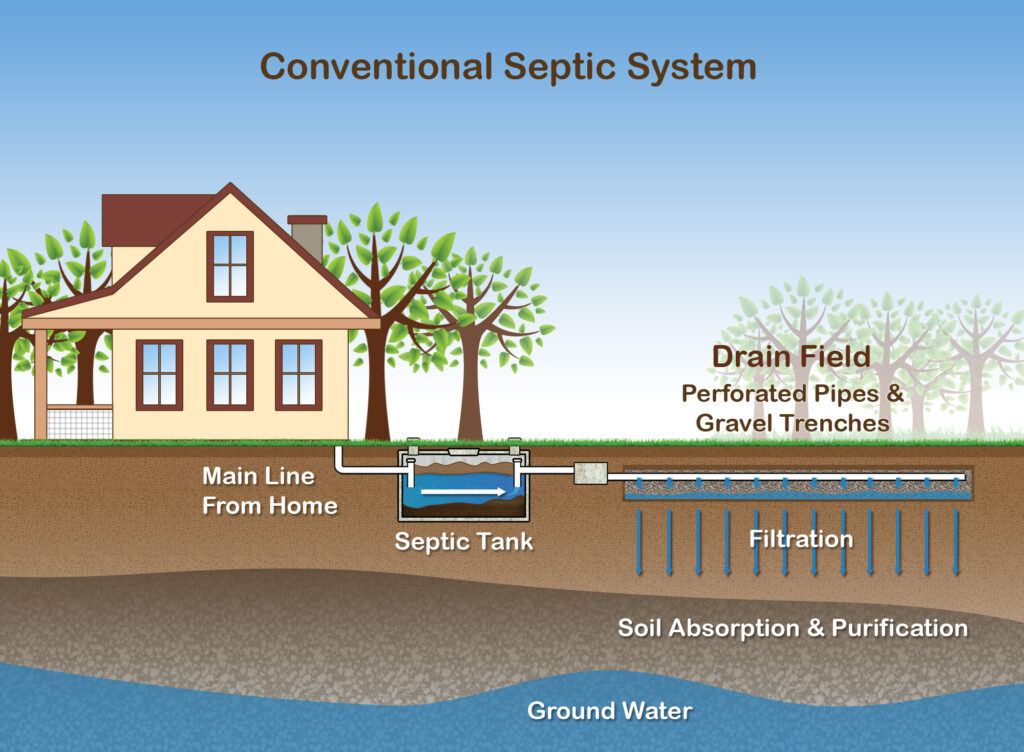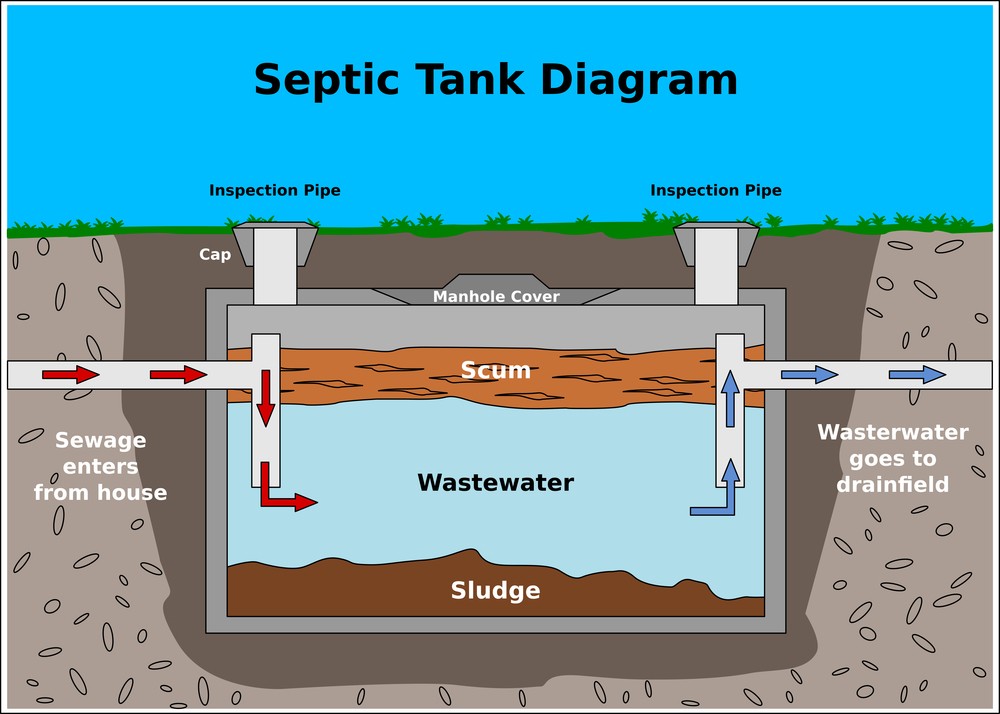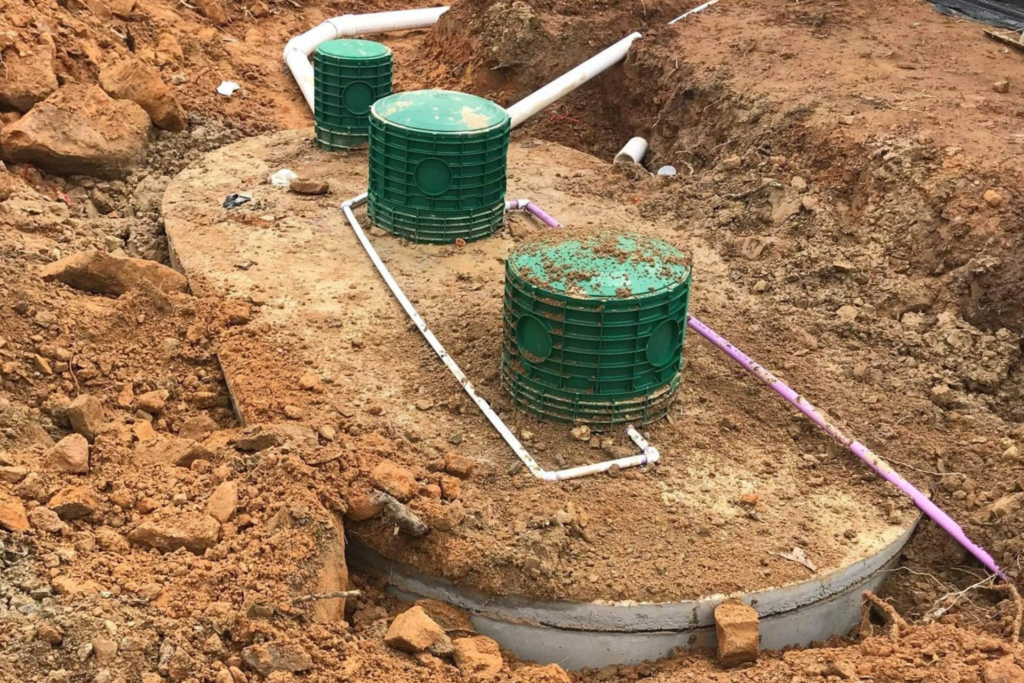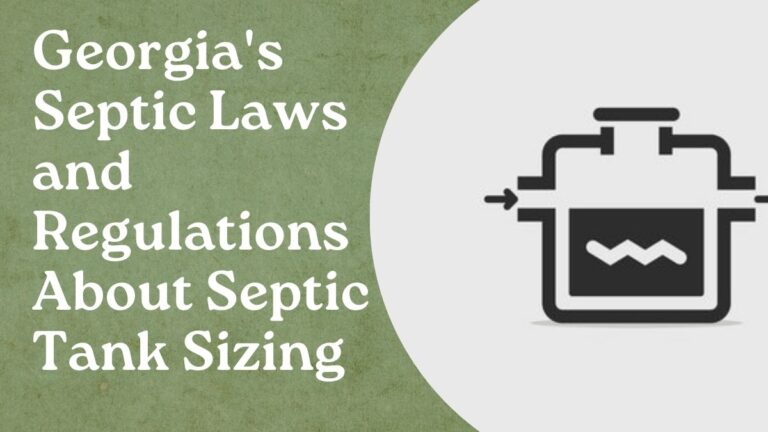Can a Homeowner Install a Septic Systems in Georgia?
“Only certified septic tank contractors from the Georgia Department of Human Resources can install or repair an on-site sewage management system.“
Thinking of installing septic systems in Georgia state? Well, you’re not alone! Many homeowners are exploring the option of DIY installation to save some hard-earned cash. But before you grab your shovel and start digging, it’s important to understand the regulations pertaining to septic systems in Georgia State.
In this blog post, we’ll dive into the ins and outs of septic systems in Georgia and explore whether or not homeowners can successfully tackle this project on their own. So let’s roll up our sleeves and get down to business – shall we?

Understanding regulations for septic systems in Georgia
When it comes to installing septic systems in Georgia, it’s crucial to understand the regulations that govern this process in Georgia. The Georgia state has specific guidelines and requirements that homeowners must adhere to when installing or repairing their septic systems in Georgia.
First and foremost, obtaining the necessary permits and licenses is essential before starting any installation work. The Georgia Department of Public Health is responsible for overseeing these permits and ensuring compliance with state regulations. They will typically conduct soil tests and inspections to determine if a property is suitable for a septic system.
Additionally, there are setback requirements that dictate how far your septic system should be from various structures such as wells, rivers, lakes, property lines, and even neighboring buildings. These setbacks help protect water sources from contamination and ensure the proper functioning of the system.
In terms of design standards, Georgia requires homeowners to follow specific guidelines regarding tank size based on the number of bedrooms in their homes. The minimum size of a septic tank in Georgia is 1,000 gallons for a four-bedroom home, and the tank must be able to hold the amount of waste collected in 24 hours and be constructed to retain the volume of waste generated during this time period. This ensures sufficient capacity for waste storage while preventing overloading of the system.
Installation must also be performed by a licensed septic tank installer who is familiar with local regulations and health department requirements. Hiring professionals can help avoid costly mistakes or potential health hazards associated with improper installations.
Regular maintenance is vital to keep your septic system functioning efficiently and prevent any environmental issues. Routine inspections every few years along with periodic pumping are essential steps in maintaining a healthy septic system.
By understanding these regulations upfront, homeowners can ensure they comply with all necessary guidelines throughout the installation process—a key aspect of protecting both public health and the environment in Georgia.

DIY installation options for Homeowners
For homeowners in Georgia who are considering installing septic systems in Georgia themselves, there are several options available. While it is important to note that the installation of a septic system requires knowledge and expertise, some individuals may feel confident in taking on this task.
- One option for DIY installation is to research and educate yourself about the process. There are numerous resources available online, including videos and articles that provide step-by-step instructions. Additionally, you can reach out to local authorities or experts in the field for guidance and advice.
- Another option is to attend workshops or classes specifically geared toward septic systems in Georgia installation. These educational opportunities can provide hands-on experience and valuable insights from professionals who have extensive knowledge in the field.
- If you choose to proceed with a DIY installation, it is crucial to obtain any necessary permits or licenses required by your local jurisdiction. Failure to do so can result in fines or legal consequences.
- Before beginning the actual installation process, it’s essential to conduct a thorough site evaluation. This includes assessing soil conditions, determining suitable locations for tanks and drain fields, as well as ensuring compliance with setback requirements.
- During the installation itself, careful attention must be paid to details such as proper tank placement and sizing, correct pipe connections, appropriate slope gradients for drainage lines, and adequate ventilation systems. It’s vital not only for functionality but also for adhering to regulatory guidelines.
- Keep in mind that while installing your own septic systems in Georgia may save money initially, there are potential risks involved if not done correctly. Mistakes during installation could lead to costly repairs down the line or even pose health hazards if contamination occurs.
- Regular maintenance of your DIY-installed septic systems in Georgia will also be critical going forward. This includes regular pumping of tanks every few years (depending on usage), and monitoring water usage habits within your household effectively managing waste disposal practices (e.g., avoiding flushing non-biodegradable items).
While DIY installations can be a viable option for some homeowners, it’s essential to weigh the pros and cons carefully before deciding to take on this task. Remember, a properly installed and maintained septic system in Georgia is crucial not only for your home’s well-being but also for the surrounding environment.

Pros and cons of installing septic systems in Georgia
Installing septic systems in Georgia on your own can have its advantages and disadvantages. One of the main benefits is cost savings. Hiring a professional to install a septic system can be quite expensive, so for homeowners on a tight budget, DIY installation may be an appealing option.
Another advantage is the sense of accomplishment that comes with completing such a significant project yourself. Installing septic systems in Georgia requires careful planning and execution, and successfully doing it yourself can give you a great sense of pride in your abilities as a homeowner.
However, there are also some drawbacks to consider. Installing septic systems in Georgia requires knowledge and expertise in plumbing and construction. If you lack experience in these areas, attempting DIY installation could lead to costly mistakes or even potential health hazards if not done correctly.
Additionally, obtaining the necessary permits and meeting all local regulations can be challenging without professional guidance. Failure to comply with these requirements could result in fines or legal issues down the line.
Furthermore, installing a septic system requires physical labor and time commitment. Excavating the land for tank placement, laying pipes accurately, and ensuring proper drainage all require effort and patience.
Maintaining your DIY-installed septic system becomes solely your responsibility over time. Regular pumping inspections should be scheduled every few years by professionals since improper maintenance can lead to backups or leaks that will damage your property’s value.
While there are pros and cons to installing a septic system on your own in Georgia considering factors like cost savings or personal satisfaction versus potential risks involved — it is important to carefully weigh these factors before making any decisions about tackling this major project independently.
Steps to take before and during the installation process
- Before embarking on the installation process for septic systems in Georgia, there are several important steps that homeowners need to take. These steps will ensure that the installation goes smoothly and complies with regulations.
- It is crucial to obtain all necessary permits and approvals from the local health department or regulatory agency. This may involve submitting detailed plans and specifications of the proposed septic system. It is important to familiarize yourself with any specific requirements or restrictions imposed by your local jurisdiction.
- Next, it is advisable to consult with a professional septic system designer or engineer who can help you determine the most suitable location for the system on your property. Factors such as soil composition, topography, and proximity to water sources should be considered during this process.
- Once these preliminary steps have been completed, it’s time to start preparing for the actual installation. Clearing away any vegetation or debris from the designated area will facilitate excavation work. Additionally, marking out underground utilities such as gas lines and electrical cables will help avoid accidents during construction.
- During installation, precise measurements should be taken to ensure proper placement of tanks and drainfields according to design specifications. Care must also be taken when connecting pipes and fittings so that everything is properly sealed and aligned.
Throughout both before and during installation processes, regular communication with local authorities can provide guidance if any questions or issues arise. Following these recommended steps will not only streamline the installation process but also minimize potential setbacks down the line.
Maintenance and care for a DIY-installed septic system
- Once you have successfully installed your own septic system, it is important to ensure that you properly maintain and care for it. Regular maintenance will help prevent costly repairs and keep your system functioning efficiently for years to come.
- One of the most crucial aspects of septic system maintenance is regular pumping. Over time, solid waste accumulates in the tank and needs to be pumped out by a professional. The frequency of pumping depends on factors such as household size, water usage, and the size of the tank. Consulting with an expert or referring to local regulations can help you determine how often this should be done.
- In addition to pumping, there are other tasks that homeowners can do themselves to ensure their septic system remains in good condition. Monitoring water usage is essential, as excessive water flow can overload the system. Fixing any leaks or dripping faucets promptly will also help conserve water.
- Proper disposal practices are another key aspect of maintaining a DIY-installed septic system. Avoid flushing non-biodegradable items down the toilet or pouring grease down drains as these can clog pipes and cause damage. Instead, use eco-friendly cleaning products that won’t harm bacteria within the tank.
- Regular inspections of your septic system are recommended to catch any issues early on before they escalate into major problems. Look out for signs such as slow-draining sinks or toilets, foul odors around your yard, or standing water near drain fields.
- Taking care of landscaping around your septic system is also important in its overall maintenance. Planting trees too close to drain fields may lead to root intrusion which could damage pipes over time.
By following these simple maintenance tips and staying vigilant about caring for your DIY-installed septic systems in Georgia, you can enjoy peace of mind knowing that it will continue working effectively without major issues.
Alternatives to DIY Installation
While some homeowners may feel confident in their ability to install septic systems in Georgia independently, others may prefer to explore alternative options. One such option is hiring a professional septic system installer. These experienced professionals have the knowledge and expertise to ensure that your septic systems in Georgia are installed correctly and meet all necessary regulations.
By hiring a professional, you can also save yourself time and effort. Installing septic systems in Georgia requires digging trenches, laying pipes, and connecting various components – tasks that can be physically demanding and time-consuming. Professionals have the equipment and manpower needed to complete these tasks efficiently.
Another alternative is purchasing a pre-fabricated or packaged septic system. These systems come with all the necessary components already assembled, making installation easier for homeowners who are not as experienced or confident in their DIY abilities.
Additionally, some areas may offer government programs or incentives for installing a septic system through approved contractors. These programs can provide financial assistance or other benefits to homeowners who choose this route.
It’s important to weigh the pros and cons of each alternative before making your decision. Consider factors such as budget, timeline, level of expertise required, and any specific regulations or requirements in your area.
Remember that while DIY installation may seem like an appealing option due to potential cost savings, it’s crucial to prioritize safety and compliance with local regulations when it comes to something as vital as your home’s sewage disposal system.
Conclusion
As we’ve explored throughout this article, the decision to install septic systems in Georgia as a homeowner in Georgia is not one to be taken lightly. While there are regulations in place that allow for DIY installation, it is important to carefully consider the pros and cons before embarking on such a project.
On the positive side, installing your own septic systems in Georgia can potentially save you money compared to hiring professionals. It also gives you full control over the process and allows for customization based on your specific needs. Additionally, some homeowners may find satisfaction in completing such an important task themselves.
However, there are several drawbacks to keep in mind. First and foremost is the complexity of installing septic systems in Georgia correctly. Without proper knowledge and experience, mistakes can be made which could lead to serious issues down the line. Furthermore, DIY installation may not always meet local or state regulations, putting you at risk for fines or other legal complications.
Before making any decisions regarding DIY septic system installation, it is crucial to thoroughly research all applicable regulations in your area. You should also assess your own skills and capabilities realistically – make sure you have access to reliable resources or professional guidance if needed.
If you decide that DIY installation isn’t right for you or simply want peace of mind knowing that everything has been done correctly from start to finish, it may be wise to hire experienced professionals who specialize in septic system installations. They will have extensive knowledge of local regulations and possess the necessary expertise required for safe and efficient installations.
Whether or not a homeowner can install their own septic systems in Georgia depends on various factors including their level of expertise, available resources, willingness to invest time into research & learning about regulations as well as potential risks associated with improper installation.
In conclusion (without explicitly saying so), while it may be tempting for some homeowners in Georgia to tackle a septic system installation themselves, it is important to carefully weigh the pros and cons and make an informed decision based on your individual circumstances.


